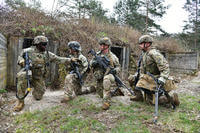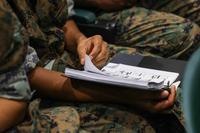The U.S. Defense Department has prepared three war budgets for Afghanistan in 2015, according to a news report.
While the spending plans are only for planning purposes, they hint at what the U.S. presence in Afghanistan might look like next year.
One scenario would keep 10,000 troops in the country, another would leave 5,000 service members there and another wouldn't keep any there, according to an article by Roxana Tiron of Bloomberg News, citing an e-mail distributed within the Pentagon by John Roth, the Pentagon's deputy comptroller for programs and budgets.
The U.S. currently has about 33,000 service members in Afghanistan, down from a peak of about 100,000 in 2011, and that number will continue to drop as the American-led combat mission wraps up by the end of the year.
Pentagon and NATO officials have said they want to keep a contingent of at least several thousand troops in the country to help maintain security and battle al-Qaeda and Taliban militants.
Earlier this year, the country's top Navy SEAL said Afghanistan remains his No. 1 war-fighting priority and that he was optimistic about the U.S.-led training mission there. "I'm pleased to say that each time I return, I see more and more progress," he said during conference in Washington. "Afghan security forces are good and thanks to our [special operations forces] investment, they are getting better."
U.S. and Afghan officials have hammered out a security pact to let American troops stay in the country after this year to help train local security forces. Yet outgoing Afghan President Hamid Karzai has refused to sign the agreement unless the U.S. ends military operations on residential homes and begins a "meaningful start" to the peace process.
Karzai will soon step down after a dozen years in power, due to constitutional limits. Earlier this month, Afghanistan held a presidential election, with widespread turnout despite reports of fraud and corruption. Abdullah Abdullah, the former foreign affairs minister who is leading in the partial results, has vowed to sign the so-called status-of-forces agreement with the U.S.
The Pentagon in its budget request for fiscal 2015, which begins Oct. 1, included a placeholder value of $79.4 billion for the war, known in military parlance as overseas contingency operations, or OCO. The funding is also used for non-war-related expenses, such as training and equipment.








